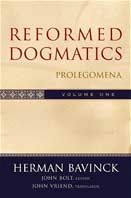Lems on Bavinck on the CoW
Rev. Shane Lems of Sunnyside URC logs in with another theology tid bit, this time from Bavinck on the Covenant of Works.
“Prior to the fall, the state of humanity and of the earth as a whole was a provisional one that could not remain as it was. It was such that it could be raised to a higher glory but in the event of human transgression could also be subjected to futility and decay” (Dogmatics III:182).Read the whole thing to get all the quotes.
“The covenant of works and the covenant of grace stand and fall together” (Dogmatics I: 579)
This is one of several posts drawing from Rev. Lems, whose has struck before on righteousness and covenant.
Labels: theology
























































